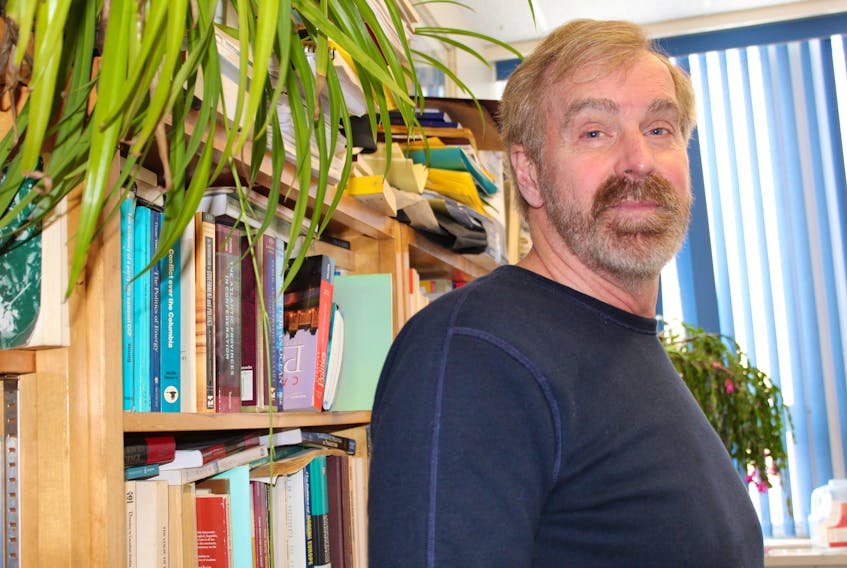ST. JOHN'S, N.L. - Memorial University political science professor Stephen Tomblin retired Dec. 31 after a 34-year career, but that career — speaking out against the Meech Lake Accord, working on the Romanow Report — almost didn’t happen.
At four years old, Tomblin was nearly dead.
It was his mother’s birthday. He was watching his father play golf, and just as his father swung back with a driver to hit the ball, young Tomblin came running up behind him.
The club hit him in the temple, fracturing his skull.
“I almost died, and then I had brain damage and I had to learn to talk all over again,” said Tomblin, speaking with The Telegram from his office at the university.
It’s an event that went on to shape Tomblin’s career.
“When I was little, even though I was (physically) big, I was always aware of the fact of what it was like to be bullied. I remember my father at a very young age said to me, ‘There’s a guy outside who’s bullying all of the kids’ … and I was quite big, and he said, ‘Here’s a dollar, go beat him up.’”
Stephen Tomblin
“The fact that I had that experience, it was a good thing because I understood what it was like to be bullied,” he said, explaining that children picked on him because of his speech.
“When I was little, even though I was (physically) big, I was always aware of the fact of what it was like to be bullied. I remember my father at a very young age said to me, ‘There’s a guy outside who’s bullying all of the kids’ … and I was quite big, and he said, ‘Here’s a dollar, go beat him up.’”
Tomblin did it, and he liked it.
He went on to take on numerous bullies during his childhood. In third grade alone, he says, he ended up in the principal’s office more than 30 times — mostly for fighting.
“I never got strapped or anything because I was always fighting people who were bigger than I was — people who were picking on my friends.”
And so began a pattern that would set the course for his life and career — a career which, at its very heart, is the idea of contesting power.
“All through my life I had this thinking,” he said. “I don’t like people who bully, including premiers or prime ministers.”
Reflecting on his years analyzing politics in the province, The Telegram asked Tomblin if he had any pearls of wisdom he’d like to share with readers. Here’s what he had to say.
Tomblin was born and raised in Calgary, and after completing his PhD at the University of British Columbia he was hired at Memorial University in 1985 under a one-year contract.
The following year, a tenure-track position opened up and he applied. He was offered the job, and another at Queen’s University.
“But I’ve always been a person who’s been interested in peripheral politics,” Tomblin laughed, explaining why he decided to stay at Memorial.
A self-described “policy wonk,” Tomblin has researched, written and spoken extensively on a wide range of topics related to politics and public policy.
His work has taken him all over the world, contributing research for groups such as the World Health Organization.
He has also been a constant go-to expert for media across the country over the years — something Noreen Golfman, Memorial’s provost and vice-president (academic), said is one of his strengths.
“Dr. Tomblin has been a terrific model of the engaged academic, blurring the lines between academic and public work,” she told The Telegram.
“Having university scholars speak to current pressing issues, especially social and political ones, is critical to the healthy exchange of ideas in a democracy, and he has never flinched from making provocative or controversial observations.”

Tomblin has taught thousands of students, and nearly every political science course at Memorial University except international relations — his primary focus is Canadian politics and public policy.
One former student is Perla Hernandez, a graduate student of political science at Memorial.
“He really inspired us to think big, to tackle big challenges and think outside of the box,” she said.
“He’s not just a great academic, but he’s also a great person. … He was a very kind professor.”
Hernandez said Tomblin would always tell students to look for where the power lies.
In that regard, Tomblin practised what he preached.
“Whether it’s the stuff I’ve done on energy or the stuff I’ve done on health, I’ve come up against some very powerful forces,” he said. “But it’s never been personal. My intent is to defend and protect the public interest, and do it by presenting evidence.”
That seemingly simple act has gotten him numerous death threats over the years — something Tomblin laughed about during his interview with The Telegram.
He said he even responded to some signed death-threat letters, telling the writers, “That’s not a very good idea,” he said with a laugh.
While Tomblin may be officially retired from the university, he says his work is not done.
Friday morning, he sat in his office – the walls lined with books, his desk scattered with papers — writing a manuscript about energy and politics in the United States.
“My retirement won’t result in me stopping what I’ve been doing in the past, it just provides more opportunities to focus more on the research as opposed to the administration of teaching.
“In terms of retirement, I would do this anyway – you don’t have to pay me because this is what I do. … I’ve never felt like I have to do anything, because I want to do it.”
Twitter: @juanitamercer_
RELATED









